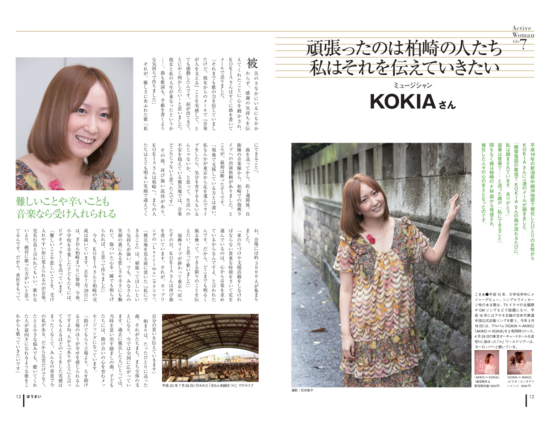“Who did the best enduring the earhquake are the people in Kashiwazaki. I want to tell it.”

Web Source: Active Woman file 7, Cabinet Office, Goverment of Japan
Original Source: “Bosai”(Disaster Management News)[No.51], Cabinet Office, Goverment of Japan
Copyright notice
The content of this web page is taken from a government webpage and has not been modified except in relation to translation. It is hereby explicitly stated that reproduction and translation of the original content (except photo images) are permitted by the government’s rule (The webpage on the rule, in Japanese).
Source
- Web Source: Active Woman file 7, Cabinet Office, Goverment of Japan (in Japanese)
- Original Source: “Bosai”(Disaster Management News)[No.51], Cabinet Office, Goverment of Japan (in Japanese)
Translation note
In 2007, Japan was hit by one of its most significant earthquakes, the Niigata Chuetsu-oki Earthquake. This interview is about the story of an e-mail from a woman to KOKIA, and the music that came from it.
Active Woman file 7: Musician KOKIA
A woman, who was affected by the Niigata Chuetsu-oki Earthquake in 2007, sent an e-mail to KOKIA.
She wrote, “Everytime song by KOKIA plays in my cell phone ringtone, I am encouraged. Thank you.”
The song that KOKIA sent as an reply was…, “Watashi ni Dekiru Koto” (“What I can do”).
Soon the song was broadcast from an FM station in Kashiwazaki and became a source of emotional support for those affected by the disaster.
Who did the best enduring the earhquake are the people in Kashiwazaki. I want to tell it.
Moved by the gratitude expressed by the woman being in the midst of the disaster, KOKIA immediately wrote a song and sent it via e-mail.
KOKIA: I had always believed in the power of song, but I was so moved by her e-mail that I realized that “Music supports people”. I was so impressed about that. It brought tears to my eyes, and I thought I just wanted to do something! It was like…, her life and mine overlapped. So, I wrote the song and the lyrics as if I were writing a letter.
That was the song “Watashi ni Dekiru Koto” (“What I can do”), which is full of tenderness. About one week after sending the song, the music band of JSDF (Japan Self-Defence Force) asked her to perform at a charity live in Kashiwazaki for reconstruction from the disaster. However, she refused at first.
KOKIA: I thought that some people might be offended if I traveled from Tokyo to perform live, unlike those who were helping the people in the affected areas. I thought that people in the affected areas, who were anxious about their lives, would not be able to afford music.
Later, again with strong persuasion, KOKIA went to Kashiwazaki. The people in Kashiwazaki welcomed her with very bright smiles, and about 3,000 gathered at the venue.
KOKIA: The people told me, “The reason we come here, taking some time to clean our houses and do disaster relief activities, is because we thirst music from the heart.” So, trying to act as cheerful as possbile and convey as much as I could, I sang the song.
On the day she returned to Tokyo after the live for reconstruction, KOKIA wrote another song. The was the coupling song “Lacrima”.
KOKIA: “Watashi ni Dekiru Koto”, which I wrote before seeing the disaster-stricken areas, is very much about wishing people the best. But, as a result of touching on the sadness and pain behind everyone’s smiles, I created the song in the hope that it would ease the broken hearts, even if only for just a moment.
Even now, KOKIA and the people in Kashiwazaki continue to interact with each other. Last July 28, she participated in the Gion Kashiwazaki Festival. She sent a video message to children who graduated from elementary school this spring.
KOKIA: Music is a way to turn something difficult and sad into an acceptable form. It may be called a publicity stunt, but I believe it is definitely better to sing than not to sing. So, I will take resposibility and convey my words.
It all started with the song sent to just one person. It quickly became the support of the entire town and is now spreading throughout Japan. For those who were affected by the disaster in the past, it is an encouraging song that reminds them of that time. For children, it is a message song that fosters a spirit of mutual support.
KOKIA: I feel happier in the position of helping others than in the position of being helped. I don’t feel that I have done enough to make people say ‘thank you’ to me at all, and I am where I am today because of everyone’s goodwill. So I would like to continue to sing songs that can make people who listen to them feel positive, not only about disasters, but also about even the smallest problems.